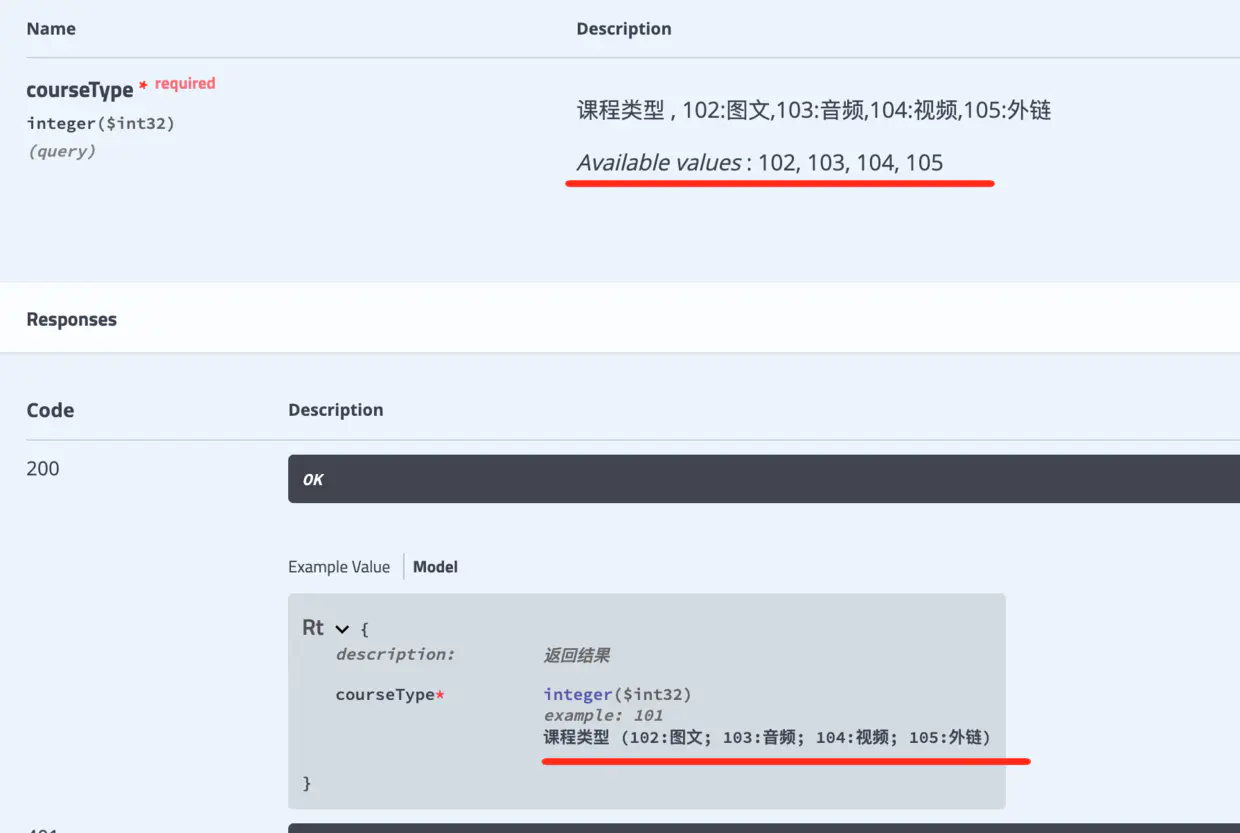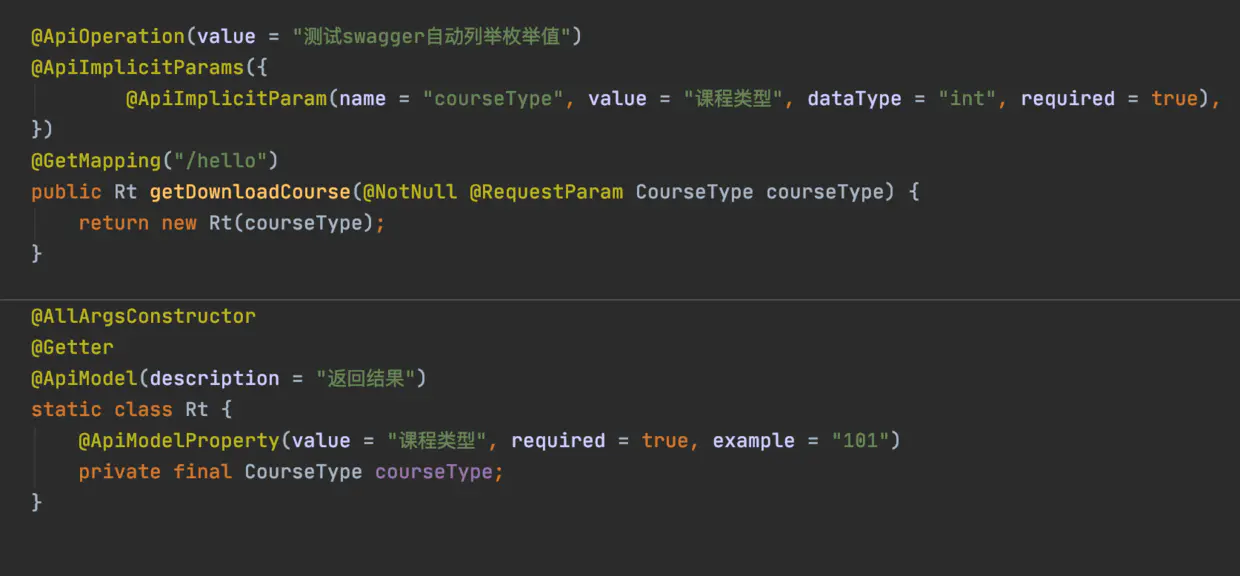Take on the previous article "One stop solution to various pain points of enumeration" At the end of the paper, it is mentioned that when using swagger to write interface documents, you need to tell the front-end enumeration types what values they have. After each increase of values, you need to not only change the code, but also find out where the corresponding values are used, and then modify the swagger documents. Anyway, I don't think it's good for Xiaohei to do so. Is there any way to let the swagger framework help us automatically list all enumeration values?
In this issue, Xiao Hei will talk about solutions.
First of all, let's look at the effect and have a perceptual understanding
Please note that the course type here is not listed manually, but automatically by swagger framework. The corresponding code is as follows:

So, how does this work?
Briefly describe the implementation:
1. Customize the swaggerdisplayeenum annotation. There are two attributes in the annotation. What are these two attributes used for? Xiaohei, I won't say it first. Read on, and you will understand~
@Target({ElementType.TYPE})
@Retention(RetentionPolicy.RUNTIME)
public @interface SwaggerDisplayEnum {
String index() default "index";
String name() default "name";
}
2. Mark @ SwaggerDisplayEnum annotation in our custom enumeration class
@Getter
@AllArgsConstructor
@SwaggerDisplayEnum(index = "type", name = "desc")
public enum CourseType {
/**
* Image & Text
*/
PICTURE(102, "Image & Text"),
/**
* audio frequency
*/
AUDIO(103, "audio frequency"),
/**
* video
*/
VIDEO(104, "video"),
/**
* Outer chain
*/
URL(105, "Outer chain"),
;
@JsonValue
private final int type;
private final String desc;
private static final Map<Integer, CourseType> mappings;
static {
Map<Integer, CourseType> temp = new HashMap<>();
for (CourseType courseType : values()) {
temp.put(courseType.type, courseType);
}
mappings = Collections.unmodifiableMap(temp);
}
@EnumConvertMethod
@JsonCreator(mode = JsonCreator.Mode.DELEGATING)
@Nullable
public static CourseType resolve(int index) {
return mappings.get(index);
}
}
3. Implement the ModelPropertyBuilderPlugin interface, extend the swagger, and list all enumeration values in the document.
public class EnumModelPropertyBuilderPlugin implements ModelPropertyBuilderPlugin {
@Override
public void apply(ModelPropertyContext context) {
Optional<BeanPropertyDefinition> optional = context.getBeanPropertyDefinition();
if (!optional.isPresent()) {
return;
}
final Class<?> fieldType = optional.get().getField().getRawType();
addDescForEnum(context, fieldType);
}
@Override
public boolean supports(DocumentationType delimiter) {
return true;
}
private void addDescForEnum(ModelPropertyContext context, Class<?> fieldType) {
if (Enum.class.isAssignableFrom(fieldType)) {
SwaggerDisplayEnum annotation = AnnotationUtils.findAnnotation(fieldType, SwaggerDisplayEnum.class);
if (annotation != null) {
String index = annotation.index();
String name = annotation.name();
Object[] enumConstants = fieldType.getEnumConstants();
List<String> displayValues =
Arrays.stream(enumConstants)
.filter(Objects::nonNull)
.map(item -> {
Class<?> currentClass = item.getClass();
Field indexField = ReflectionUtils.findField(currentClass, index);
ReflectionUtils.makeAccessible(indexField);
Object value = ReflectionUtils.getField(indexField, item);
Field descField = ReflectionUtils.findField(currentClass, name);
ReflectionUtils.makeAccessible(descField);
Object desc = ReflectionUtils.getField(descField, item);
return value + ":" + desc;
}).collect(Collectors.toList());
ModelPropertyBuilder builder = context.getBuilder();
Field descField = ReflectionUtils.findField(builder.getClass(), "description");
ReflectionUtils.makeAccessible(descField);
String joinText = ReflectionUtils.getField(descField, builder)
+ " (" + String.join("; ", displayValues) + ")";
builder.description(joinText).type(context.getResolver().resolve(Integer.class));
}
}
}
}
4. Implement the ParameterBuilderPlugin and OperationBuilderPlugin interfaces, and enumerate all values of enumeration parameters.
public class EnumParameterBuilderPlugin implements ParameterBuilderPlugin, OperationBuilderPlugin {
private static final Joiner joiner = Joiner.on(",");
@Override
public void apply(ParameterContext context) {
Class<?> type = context.resolvedMethodParameter().getParameterType().getErasedType();
if (Enum.class.isAssignableFrom(type)) {
SwaggerDisplayEnum annotation = AnnotationUtils.findAnnotation(type, SwaggerDisplayEnum.class);
if (annotation != null) {
String index = annotation.index();
String name = annotation.name();
Object[] enumConstants = type.getEnumConstants();
List<String> displayValues = Arrays.stream(enumConstants).filter(Objects::nonNull).map(item -> {
Class<?> currentClass = item.getClass();
Field indexField = ReflectionUtils.findField(currentClass, index);
ReflectionUtils.makeAccessible(indexField);
Object value = ReflectionUtils.getField(indexField, item);
Field descField = ReflectionUtils.findField(currentClass, name);
ReflectionUtils.makeAccessible(descField);
Object desc = ReflectionUtils.getField(descField, item);
return value.toString();
}).collect(Collectors.toList());
ParameterBuilder parameterBuilder = context.parameterBuilder();
AllowableListValues values = new AllowableListValues(displayValues, "LIST");
parameterBuilder.allowableValues(values);
}
}
}
@Override
public boolean supports(DocumentationType delimiter) {
return true;
}
@Override
public void apply(OperationContext context) {
Map<String, List<String>> map = new HashMap<>();
List<ResolvedMethodParameter> parameters = context.getParameters();
parameters.forEach(parameter -> {
ResolvedType parameterType = parameter.getParameterType();
Class<?> clazz = parameterType.getErasedType();
if (Enum.class.isAssignableFrom(clazz)) {
SwaggerDisplayEnum annotation = AnnotationUtils.findAnnotation(clazz, SwaggerDisplayEnum.class);
if (annotation != null) {
String index = annotation.index();
String name = annotation.name();
Object[] enumConstants = clazz.getEnumConstants();
List<String> displayValues = Arrays.stream(enumConstants).filter(Objects::nonNull).map(item -> {
Class<?> currentClass = item.getClass();
Field indexField = ReflectionUtils.findField(currentClass, index);
ReflectionUtils.makeAccessible(indexField);
Object value = ReflectionUtils.getField(indexField, item);
Field descField = ReflectionUtils.findField(currentClass, name);
ReflectionUtils.makeAccessible(descField);
Object desc = ReflectionUtils.getField(descField, item);
return value + ":" + desc;
}).collect(Collectors.toList());
map.put(parameter.defaultName().or(""), displayValues);
OperationBuilder operationBuilder = context.operationBuilder();
Field parametersField = ReflectionUtils.findField(operationBuilder.getClass(), "parameters");
ReflectionUtils.makeAccessible(parametersField);
List<Parameter> list = (List<Parameter>) ReflectionUtils.getField(parametersField, operationBuilder);
map.forEach((k, v) -> {
for (Parameter currentParameter : list) {
if (StringUtils.equals(currentParameter.getName(), k)) {
Field description = ReflectionUtils.findField(currentParameter.getClass(), "description");
ReflectionUtils.makeAccessible(description);
Object field = ReflectionUtils.getField(description, currentParameter);
ReflectionUtils.setField(description, currentParameter, field + " , " + joiner.join(v));
break;
}
}
});
}
}
});
}
}
This article is more boring, I don't know how to tell Xiaohei, just appendix the source code. If some readers are still unclear after reading, please leave a message for me and I will answer one by one. Thank you for reading~~
Relevant source code has been uploaded to github: https://github.com/shenjianeng/solution-for-enums